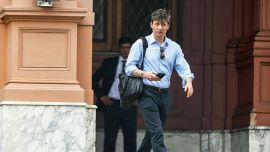Argentina is the land of euphemisms. Take this for instance: the black-market dollar is known locally as the “blue dollar.” Now it appears the leaders of this nation at press time were gearing to announce what will effectively be something close to a lockdown, without actually calling it a lockdown. So, what is it? A “blue” lockdown? More than 60,000 deaths have been reported so far and the situation continues to worsen.
Fifteen days ago President Alberto Fernández, the leader of the ruling centre-left Peronist coalition, signed a decree closing schools in the Buenos Aires metropolitan area (Buenos Aires City plus Greater Buenos Aires) for a fortnight to fight the rising number of Covid-19 cases. The decree triggered a legal battle with Buenos Aires City Mayor Horacio Rodríguez Larreta, a leader from the centre-right opposition Juntos por el Cambio coalition, who took the case to the Supreme Court and used a City court ruling to keep schools open in the nation’s capital in the meantime.
The Supreme Court ruling was still pending at the time of writing, but the confrontation has morphed into a series of meetings between the national government, provincial governors and the City mayor. Fernández and Rodríguez Larreta, a potential presidential candidate in 2023, are back to talking things over once again like they did last year. Those talks include Buenos Aires Governor Axel Kicillof, a heavyweight Kirchnerite in the president's Frente de Todos coalition, who has warned that drastic measures are needed to “lower not flatten” the curve because the health system is on the verge of crumbling. Kicillof rules over Greater Buenos Aires, where schools heeded the presidential decree.
The Supreme Court sat on the legal conflict and waited for the politicos to go back to the negotiating-table after a major public spat that left many parents with kids in schools feeling that they were hostage of a petty political dispute in an election year. The presidential decree just over two weeks also left Education Minister Nicolás Trotta, a member of Fernández’s inner circle, in a tight spot, because he had implied that schools would remain open on the same day the decision was announced. Since then, Trotta has resurfaced in meetings with private schools, championing an “administered attendance” plan in schools, a clunky definition which could well be another euphemism (in this case to deal with Rodríguez Larreta’s defiance and a bunch of angry “organised parents” fuming in WhatsApp groups).
The metropolitan area, known by the acronym AMBA, is at the heart of this conflict. Buenos Aires City is a centre-right stronghold while Greater Buenos Aires, the sprawling urban belt that surrounds the capital, usually votes Kirchnerite. Millions commute from Greater Buenos Aires to the Autonomous City of Buenos Aires (to call it by its full title) every day. Ask many experts and that mammoth commute, which has been running almost normally ever since strict lockdown restrictions were lifted last year, explains why more than 25,000 Covid-19 cases are being reported daily.
The new restrictions, presumably the product of consensus, are designed to buy time for more Covid-19 vaccines to arrive and for the health system to cope during what is looking like a looming winter of discontent. Vaccines are arriving from Russia and China, but the flow is slow and limited (7.7 million jabs have been given in a country with a population of 45 million people). The national government is meanwhile reportedly reopening negotiations with Pfizer to buy its vaccine after authorities said last year that the drug-maker’s conditions for legal protection were unacceptable. An ambitious plan with AstraZeneca, involvingthe production of millions of jabs to be produced in Argentina and Mexico, announced last year by Fernández has failed to materialise due to productivity delays in Mexico. Argentina's Health Ministry has formally requested a report from AstraZeneca, a British-Swedish pharmaceutical company, on the situation.
Despite the two sides talking, however, Covid-19 has not killed Argentina's polarisation. Rodríguez Larreta is a moderate who has to deal with a hawkish wing in the centre-right coalition headed by former president Mauricio Macri and his former security minister Patricia Bullrich. The latter could even challenge Rodríguez Larreta in Buenos Aires City by forcing a primary to decide who will head the congressional slate in the capital, without the mayor’s prior endorsement. This internal conflict in the country's largest opposition group possibly explains why Rodríguez Larreta chose to defy the president's decision to close schools by decree 15 days ago.
Defeat for the mayor in that potential primary would be an embarrassment and a blow to his presidential hopes. Bullrich is known for her attacks against the national government and this week she even went as far as quipping ironically during an interview that Argentina should give away the disputed Malvinas Islands if that will clinch it a contract with Pfizer. Not everybody found Bullrich’s remark witty or funny, considering the last military dictatorship sent young conscripts to the front in the 1982 war over the islands with Britain that was ultimately lost.
Still, such inflammatory agitation will not go away – it is inevitable because the elections are nearing. The candidates are hooked on posturing already. The anxiety that has gripped Fernández, Kicillof and Rodríguez Larreta is a sign that the pandemic could well turn the midterm elections, originally scheduled for October and now set to be pushed back by a month, into an unpredictable contest. Polls show families are more concerned about the economy than the pandemic. Food inflation is rampant despite the national government’s efforts to control prices. The peso dropped against the dollar in the black market early in the week.
Covid-19 is ravaging Latin America --and that includes Argentina.























Comments